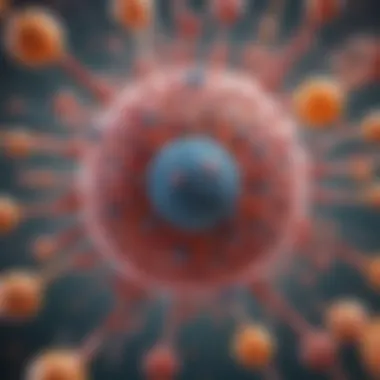Dr. Jim Allison and the Nobel Prize in Medicine


Article Overview
Purpose of the Article
This article aims to examine the transformative contributions of Dr. Jim Allison in the field of cancer immunotherapy. It highlights his groundbreaking research, which led to advances in cancer treatment through the discovery of immune checkpoint inhibitors. The article also illuminates the significance of his Nobel Prize in Physiology or Medicine, showcasing its impact on the scientific community and the broader landscape of oncology.
Relevance to Multiple Disciplines
Dr. Allison's work transcends mere oncology. It holds significance for various fields including molecular biology, pharmacology, and immunology. Understanding his contributions can provide valuable insights not only for healthcare professionals and researchers but also for educators and students who aim to grasp the complexities of cancer treatment and the evolution of medical therapies.
Research Background
Historical Context
The progression in cancer treatment has been marked by various strategies, from surgery and radiation to traditional chemotherapy. However, these methods often fall short, leading to a gap in effective long-term solutions for patients. In the late 20th century, a paradigm shift began to emerge with the advent of immunotherapy as a viable alternative. Dr. Jim Allison's pioneering research played a crucial role in this transition, particularly in the area of immune checkpoint blockage.
Key Concepts and Definitions
To appreciate Dr. Allison's achievements, it is vital to understand some key concepts:
- Immune Checkpoint Inhibitors: These are agents designed to block proteins that suppress immune responses. By inhibiting these checkpoints, the immune system can more effectively target and destroy cancer cells.
- T-cell Activation: T-cells are critical components of the immune system. They identify and eliminate infected or cancerous cells. Understanding how they are activated is central to developing effective immunotherapy.
- Cancer Immunotherapy: This refers to treatments that utilize the body’s immune system to fight cancer, shifting the therapeutic approach from direct attacks on tumors to enhancing immune responses.
By examining these foundational aspects along with Dr. Allison's contributions, we can better understand the revolutionary changes in cancer treatment and the importance of continued research in this area.
Prelims to Dr. Jim Allison
Dr. Jim Allison stands as a towering figure in contemporary medical science. His pioneering work in cancer immunotherapy has not only altered the course of treatment for patients but also reshaped the fundamental understanding of the immune system's role in combatting cancer. This section provides an essential foundation for understanding Allison's significance in this field.
It is crucial to note that Dr. Allison's journey began with a curiosity that would lead him to challenge established norms in oncology. He identified the potential of harnessing the immune system to fight cancer, an idea that was, at the time, largely overlooked. Through his relentless pursuit of knowledge and innovation, Allison would go on to develop groundbreaking therapies that have been implemented in clinical practice.
By delving into Dr. Allison's early life and education, we start to see the formative experiences that shaped his approach to science. His career beginnings reveal the challenges and triumphs that he faced, providing valuable insight into the deep commitment required in research. Ultimately, understanding Allison's background gives context to his momentous achievements, including the prestigious Nobel Prize in Physiology or Medicine.
In summary, this section sets the stage for a comprehensive examination of Dr. Jim Allison's contributions to oncology. His work continues to impact the lives of countless patients and has opened new avenues for research and treatment. Here, we explore the initial chapters of his life, which laid the groundwork for his future success.
Understanding Cancer Immunotherapy
Cancer immunotherapy has emerged as a transformative approach in the fight against cancer. This section elucidates its significance and presents a comprehensive exploration of its fundamentals and principles. Dr. Jim Allison's work in this area specifically revolutionized how we perceive cancer treatment, emphasizing the immune system's role. The concept of utilizing the body's own defenses against cancer represents a paradigm shift in oncology. Understanding this topic is crucial for appreciating the subsequent sections regarding Dr. Allison's contributions and the broader implications of immunotherapy in contemporary medicine.
Fundamentals of Immunology
Immunology is the study of the immune system, a complex network of cells and proteins that defend the body against harmful pathogens. At the core of this discipline is the understanding of how the body recognizes and destroys invading entities, including bacterial infections and potentially cancerous cells. The immune system consists primarily of white blood cells, antibodies, and various signaling molecules.
Key players in the immune response include T cells, B cells, and antigen-presenting cells. T cells, particularly CD8+ cytotoxic T cells, are pivotal in targeting infected or malignant cells. B cells, on the other hand, produce antibodies that tag pathogens for destruction. An essential aspect of immunology is the concept of self vs. non-self recognition. The body has mechanisms to tolerate normal cells while remaining vigilant against abnormal cell growth.
Principles of Cancer Immunotherapy
Cancer immunotherapy harnesses and enhances the innate powers of the immune system to combat cancer. Unlike traditional treatments like chemotherapy and radiation, this approach aims to stimulate the body’s natural defenses. This therapeutic strategy can be categorized into several types, including monoclonal antibodies, cancer vaccines, and immune checkpoint inhibitors.
Immune checkpoint inhibitors have gained significant attention, particularly due to their effectiveness in certain types of cancers. These agents block proteins that inhibit immune responses, effectively unleashing T cells to attack cancer cells. This mechanism is central to Dr. Allison's research, which provided foundational knowledge that led to the development of these inhibitors.
Some of the benefits of cancer immunotherapy include:
- Durability of responses, as the immune memory can lead to long-lasting effects.
- Specific targeting, which helps in sparing normal tissues, leading to milder side effects compared to conventional therapies.
- Potential to treat advanced stages, offering options for patients with limited alternatives.
Despite these advantages, challenges persist, such as variability in individual responses and the need for biomarkers to select appropriate patients for specific treatments. The success and continuing evolution of immunotherapy hinge on harnessing deeper insights from immunological studies and clinical practice. By exploring these fundamentals, one gains a clearer picture of the landscape that shaped Dr. Jim Allison’s pioneering efforts.


Checkpoint Inhibitors: A Revolutionary Approach
Checkpoint inhibitors represent a transformative strategy in cancer treatment. Their emergence in oncology marks a shift from traditional therapeutic modalities to innovative approaches that leverage the body’s own immune system. The significance of checkpoint inhibitors lies not only in their ability to improve patient outcomes but also in reshaping how oncologists view cancer treatment. By understanding and manipulating the immune checkpoints, researchers can enhance the immune response against tumors, leading to promising therapeutic avenues.
Numerous cancers evade immune detection. Tumor cells employ a variety of mechanisms, including immune checkpoints, to suppress immune activity. The discovery of these checkpoints has unveiled potential targets for therapeutic intervention. By blocking these pathways, checkpoint inhibitors can reinvigorate immune responses to recognize and destroy cancer cells, offering a new weapon in the fight against cancer.
Mechanisms of Action
Checkpoint inhibitors function primarily by interfering with proteins that inhibit T cell activation and function. The most studied checkpoints include programmed cell death 1 (PD-1) and cytotoxic T-lymphocyte-associated protein 4 (CTLA-4). When T cells encounter tumor cells, these checkpoints may be activated, leading to immune suppression.
- PD-1/PD-L1 Pathway: Tumor cells can express PD-L1, which interacts with PD-1 on T cells. This interaction dampens T cell activity, enabling cancer cells to escape immune surveillance. Inhibitors of PD-1 or PD-L1 effectively release this suppression, allowing T cells to proliferate and attack tumors.
- CTLA-4 Pathway: Similar in function, CTLA-4 binds to CD80/CD86 on antigen-presenting cells, leading to a decrease in T cell activation. By blocking CTLA-4, these inhibitors enhance T cell responses, further promoting cancer cell destruction.
The dual inhibition of PD-1 and CTLA-4 has shown synergistic effects in some cases, providing increased chances of clinical benefits for patients.
Types of Checkpoint Inhibitors
Checkpoint inhibitors are classified based on the specific targets they address. Each inhibitor has unique profiles and applications:
- Anti-PD-1 Inhibitors: These include pembrolizumab and nivolumab. Used in various cancers such as melanoma, non-small cell lung cancer, and Hodgkin lymphoma, they have changed treatment protocols significantly.
- Anti-PD-L1 Inhibitors: Atezolizumab and durvalumab are examples that target PD-L1. Their action is similar to PD-1 inhibitors but may have distinct characteristics regarding patient eligibility and outcomes.
- Anti-CTLA-4 Inhibitors: Ipilimumab is a notable anti-CTLA-4 treatment, primarily indicated for melanoma. It highlights a unique application in combining therapies with PD-1 inhibitors for enhanced efficacy.
The emergence of these checkpoint inhibitors reflects a significant progression in cancer therapeutics, providing new hope for patients with advanced malignancies.
The emergence of these checkpoint inhibitors reflects a significant progression in cancer therapeutics, providing new hope for patients with advanced malignancies.
Checkpoint inhibitors have not only facilitated improved survival rates but also have incited new research directions in personalized medicine. Their integration into treatment regimens continues to stimulate a re-evaluation of cancer management strategies on a global scale.
Dr. Allison's Nobel Prize Achievement
Dr. Jim Allison's achievement in receiving the Nobel Prize is a pivotal moment in the field of cancer research. This recognition not only honors his individual contributions but also underscores the revolutionary advancements in cancer immunotherapy. The Nobel Prize emphasizes significant strides made in understanding the interactions between the immune system and cancer. Allison’s work has transformed how oncologists approach cancer treatment, moving from traditional methods to harnessing the power of the patient’s immune system.
The Nobel Announcement
The announcement of Dr. Jim Allison as a Nobel Prize laureate in Physiology or Medicine was made on October 1, 2018. It was a culmination of decades of relentless research and innovation. The Nobel committee highlighted his discoveries concerning programmed cell death 1 (PD-1) and its role in regulating immune responses. This was an essential part of what would become known as checkpoint inhibitors.
The announcement sparked widespread acclaim and recognition from both the scientific community and the general public. It brought to light the urgency and importance of cancer research, which often faces difficulties in funding and public attention. Dr. Allison shared the award with Tasuku Honjo, another key figure in immunotherapy, recognizing the collective contributions in this domain.
Dr. Allison's reaction to the award was modest yet hopeful, expressing gratitude for the acknowledgment of his life's work. He emphasized the significance of persistence in scientific research and the impact that fundamental discoveries can have on patient outcomes. His work exemplifies how understanding the body's immune mechanisms can lead to breakthroughs in therapeutic strategies.
Significance of the Award
The significance of the Nobel Prize awarded to Dr. Allison extends beyond personal achievement; it acts as a beacon for the future of cancer treatment. This award validates years of research into immune checkpoint inhibitors. These treatments have led to substantial improvements in the survival rates of patients with various types of cancers such as melanoma and lung cancer.
The Nobel Prize also serves to inspire future generations of scientists. It underscores the importance of curiosity-driven research and the necessity for innovative thinking in medicine. The recognition highlights the potential of immunotherapy as a standard treatment approach, shifting the treatment paradigm from mere symptom management to aiming for actual cures.
"This award acknowledges the importance of understanding how the immune system can be harnessed to combat cancer. It opens new discussions and possibilities in the field of oncological research," said Dr. Allison after receiving the honor.
"This award acknowledges the importance of understanding how the immune system can be harnessed to combat cancer. It opens new discussions and possibilities in the field of oncological research," said Dr. Allison after receiving the honor.
In summation, Dr. Jim Allison's Nobel Prize achievement signifies a turning point in cancer research. It not only accolades his contributions but also propels the discussion around immunotherapy and its role in modern medical practice. This recognition instills hope for continued progress in the fight against cancer.
Impact on Clinical Practice
The impact of Dr. Jim Allison's work on clinical practice in oncology is profound and has reshaped the landscape of cancer treatment. His pioneering research on cancer immunotherapy has introduced new paradigms in the way oncologists approach treatment, shifting from traditional methods reliant on chemotherapy and radiation to innovative therapies that harness the patient’s immune system. This transition is significant because it not only improves the efficacy of treatments but also aims to reduce adverse effects associated with conventional therapies.
Adoption of Immunotherapy in Oncology


The adoption of cancer immunotherapy in the oncology field has steadily increased since the initial discoveries made by Dr. Jim Allison. Following the introduction of checkpoint inhibitors, such as those targeting the PD-1 and CTLA-4 pathways, clinicians have begun integrating these therapies into routine practice. The FDA has approved various immunotherapies that are now standard across several cancer types, including melanoma, lung cancer, and bladder cancer.
The main advantages of immunotherapy include:
- Durability of Response: Many patients experience a long-term response after treatment, with some demonstrating complete remission.
- Tailored Approaches: Immunotherapy can be adapted based on individual tumor markers and patient biology. This personalized treatment opens new horizons for patient selection and therapy.
- Combination Strategies: Oncology practices are increasingly exploring combination therapies that pair immunotherapy with established treatments. This may enhance overall patient outcomes and extend survival time.
The shift towards immunotherapy reflects a broader commitment to developing effective and less toxic treatment options, which is increasingly prioritized in oncological practices.
Case Studies of Success
Numerous case studies illustrate the success of immunotherapy in clinical settings, showcasing its transformative potential. One prominent example is the success of ipilimumab in patients with advanced melanoma. Clinical trials indicated that a subset of patients achieved sustained response rates and notable survival benefits when treated with this CTLA-4 inhibitor. In some cases, patients who had previously exhausted all other options found hope through immunotherapy.
Another example is the use of pembrolizumab for metastatic non-small cell lung cancer. This PD-1 inhibitor demonstrated significant improvement in overall survival compared to traditional chemotherapy, leading to its adoption as a first-line treatment for eligible patients.
These real-world applications highlight the effectiveness of Dr. Allison's contributions and showcase the tangible benefits of immunotherapy for patients. As research continues and new data emerges, oncologists are better equipped to provide life-saving options, continuing to improve patient outcomes and quality of life.
"The future of cancer treatment lies not only in targeting tumors but in empowering the immune system to do its work."
"The future of cancer treatment lies not only in targeting tumors but in empowering the immune system to do its work."
Format of clinical practice is evolving, focusing on benefits that target both survival and quality of life, handed down through foundational research undertaken by pioneers like Dr. Jim Allison.
Challenges in Cancer Research
Cancer research is a complex field, marked by numerous challenges that scientists and medical professionals must navigate. Understanding these obstacles is critical because they impact not only the pace of research but also the effectiveness of treatment options for patients. This section explores scientific hurdles and ethical considerations that researchers face in their pursuit of innovative solutions for cancer treatment.
Scientific Hurdles
Scientific hurdles refer to the various technical and conceptual barriers that can impede progress in cancer research. Some notable challenges include:
- Tumor Heterogeneity: Tumors often consist of a diverse range of cell types, each exhibiting unique genetic and phenotypic characteristics. This heterogeneity complicates the development of therapies that work uniformly across different patient populations.
- Immune System Complexity: The immune system’s intricate interplay with cancer cells presents both challenges and opportunities. Different patients may respond variably to immunotherapies systemically influenced by their genetic makeup and individual immune responses.
- Resistance Mechanisms: Tumors can develop resistance to treatments, making it challenging to achieve long-term positive outcomes. Understanding these mechanisms is essential to improving therapies and determining why some patients do not respond favorably to treatment.
- Regulatory Challenges: Navigating the regulatory landscape for drug approval can slow the entry of new therapies into clinical practice. The rigorous demands set by governing bodies aim to ensure patient safety but can extend timelines significantly.
Ethical Considerations in Trials
Conducting cancer research involves ethical challenges that must be seriously considered. Participants in clinical trials are often vulnerable and must be protected from potential risks associated with experimental treatments. The significant ethical issues include:
- Informed Consent: Ensuring that participants fully understand what they are consenting to is paramount. Researchers must provide clear and accessible information about potential risks, benefits, and the nature of the trial itself.
- Participant Equity: There is a growing emphasis on ensuring diverse representation in clinical trials. Ethical research means accounting for gender, race, and socioeconomic factors to better understand the efficacy of treatments across various populations.
- Risk vs. Benefit Analysis: Researchers must continuously evaluate the risk associated with trial participation compared to the potential benefits. Striking the right balance is necessary, especially in trials of experimental therapies where long-term outcomes are not fully understood.
- Data Integrity and Transparency: Upholding data integrity and ensuring transparent reporting of results is critical. Disregarding negative results can skew the understanding of a treatment's effectiveness and mislead future research efforts.
Navigating the challenges in cancer research is essential not only for the advancement of therapies but also for maintaining the ethical standards vital for patient rights and safety.
Navigating the challenges in cancer research is essential not only for the advancement of therapies but also for maintaining the ethical standards vital for patient rights and safety.
The Future of Cancer Immunotherapy
Cancer immunotherapy represents a frontier in oncology, redefining treatment paradigms and patient outcomes. As researchers continue to explore this dynamic field, understanding its future becomes essential. Numerous factors will shape the trajectory of cancer immunotherapy, including the development of new therapies, technological advancements, global perspectives, and ethical considerations. This section aims to examine the emerging trends and innovations that promise to transform cancer treatment in coming years.
Emerging Therapies and Technologies
Research in cancer immunotherapy is evolving rapidly, opening avenues for innovative therapies. Some key emerging therapies include:
- CAR T-cell therapy: This involves modifying a patient's T cells to recognize and attack cancer cells. The process enhances the body’s immune response and has shown success in hematological cancers.
- Personalized vaccines: These vaccines are tailored to the specific genetic profile of a patient's tumor. By leveraging unique tumor antigens, they aim to provoke a stronger immune reaction.
- Oncolytic viruses: These engineered viruses selectively target and kill cancer cells while stimulating an immune response against the tumor.
- Combination therapies: The integration of different immunotherapy agents, such as checkpoint inhibitors with cancer vaccines, shows promise in enhancing efficacy and overcoming resistance.
These therapies underline a trend towards precision medicine, where treatments are customized based on individual biomarker profiles. Such approaches may lead to better patient outcomes and fewer side effects.
Global Perspectives in Cancer Treatment


Cancer is a global health challenge, and perspectives on immunotherapy vary by region. Countries with advanced medical research, like the United States, lead in adoption and development of immunotherapy. However, there are significant disparities globally. Here are some points to consider regarding global perspectives:
- Access to Treatment: In more developed nations, immunotherapy treatments are becoming standard practice. Contrarily, in lower-income countries, access remains limited due to costs and lack of infrastructure.
- Regulatory Challenges: Different countries have varying regulations that affect how quickly new therapies can be introduced. For example, the FDA in the United States has a robust process for expedited approvals, which can lead to faster availability of breakthroughs compared to other regions.
- Cultural Attitudes: In some cultures, traditional beliefs may influence perceptions of modern medical therapies. This can impact patient willingness to pursue innovative cancer treatments.
"The potential of immunotherapy in cancer treatment is unprecedented, yet understanding its global implications remains vital for its success."
"The potential of immunotherapy in cancer treatment is unprecedented, yet understanding its global implications remains vital for its success."
The landscape of cancer immunotherapy is shifting rapidly. With ongoing research, innovative therapies, and a global commitment to equitable access, the future holds great promise for the millions affected by cancer.
Dr. Allison’s Continuing Contributions
Dr. Jim Allison's work did not end with the Nobel Prize. His ongoing contributions to cancer immunotherapy extend far beyond his initial discoveries. These efforts are crucial for both the advancement of science and the refinement of clinical practices.
His contributions can be viewed through two lenses: ongoing research efforts and educational initiatives. Both are interdependent and critical in maintaining the momentum of innovation in cancer treatment.
Ongoing Research Efforts
Dr. Allison has committed significant energy to research that explores new avenues in cancer therapy. He leads several projects that aim at understanding complex immune responses and developing next-generation immunotherapies. Current research incorporates both the examination of novel checkpoint inhibitors and combination therapies.
The study of biomarkers is also central to his exploration. Identifying tumor markers helps in personalizing treatment plans for patients. The aim is both to improve therapeutic efficacy and reduce side effects. This approach is particularly valuable given the diverse nature of cancer and its responses to treatment.
Research efforts have expanded into more aggressive cancers, which traditionally have been difficult to treat. Challenging cancer types such as pancreatic cancer and melanoma are now part of Allison's focus, intending to develop strategies for overcoming resistance to existing therapies.
"The work continues to be groundbreaking and ever-evolving, with a keen focus on the specifics of individual cases to atttain better outcomes."
"The work continues to be groundbreaking and ever-evolving, with a keen focus on the specifics of individual cases to atttain better outcomes."
Educational Initiatives
Dr. Allison recognizes the imperative of educating the next generation of scientists. His initiatives are designed to inspire students and researchers alike. These efforts include mentoring programs, workshops, and lectures designed to highlight the importance of immunotherapy in oncology.
Collaborations with universities allow for knowledge sharing and hands-on experiences. Dr. Allison encourages a culture of inquiry and problem-solving. Educators are tasked with instilling confidence in students, fostering a sense of responsibility to further cancer research.
Allison also advocates for increased public awareness of cancer research. He believes that the public plays an integral role in the funding and support of research initiatives. By making scientific accomplishments accessible, he aims to demystify the work involved in cancer treatment.
Finale
In summarizing the monumental contributions of Dr. Jim Allison, it becomes clear how pivotal his work in cancer immunotherapy has been. His relentless pursuit of understanding immune responses led to the development of groundbreaking treatments. The approval and use of checkpoint inhibitors fundamentally altered the landscape of cancer treatment. This innovation has not only saved lives but also opened new avenues for research and therapy in oncology.
Recapitulating Dr. Allison's Impact
Dr. Allison's impact on cancer treatment is profound and multifaceted. He transformed a theoretical understanding of immune checkpoints into clinical realities, demonstrating that the immune system can be harnessed to fight cancer effectively. His work on ipilimumab, the first FDA-approved immune checkpoint inhibitor, laid the foundation for a new era in cancer therapy.
- Key Contributions:
- Identification of CTLA-4 as an immune checkpoint
- Development of therapies leading to significant patient responses
- Establishing a new paradigm in cancer treatment focused on immunity
This approach has not only provided hope for previously untreatable cancers but has also spurred extensive research aimed at expanding the applications of immunotherapy. The acknowledgment of his work through the Nobel Prize further validates and celebrates the importance of innovative thinking in medical research.
Final Thoughts on Future Directions
Looking toward the future, the field of cancer immunotherapy continues to evolve. Dr. Allison's contributions urge a rethinking of cancer treatment models. Advances in technology and our understanding of the immune system are paving the way for novel therapies.
As researchers explore emerging immunotherapeutic strategies, there are several areas to consider:
- Combination therapies that leverage multiple treatment modalities
- Personalized medicine tailored to individual patient profiles
- Broader applications of immunotherapy in various cancer types
"The journey of cancer research is long and complex, but innovations like those pioneered by Dr. Allison provide a guiding light."
"The journey of cancer research is long and complex, but innovations like those pioneered by Dr. Allison provide a guiding light."



